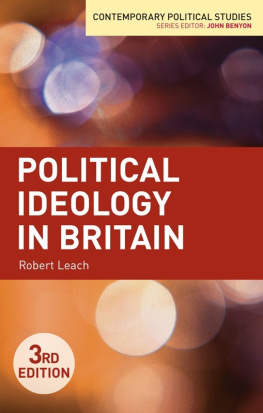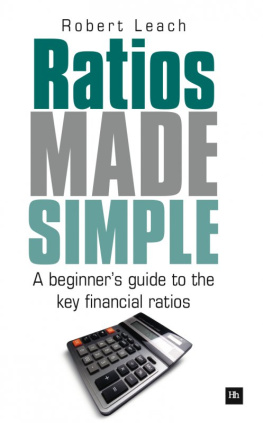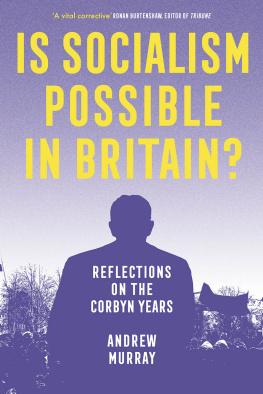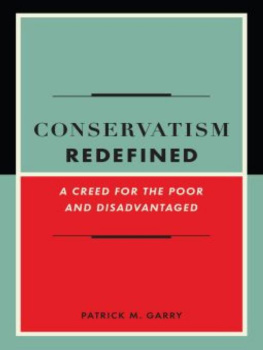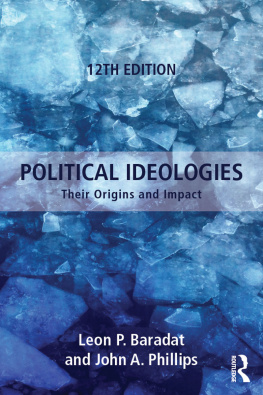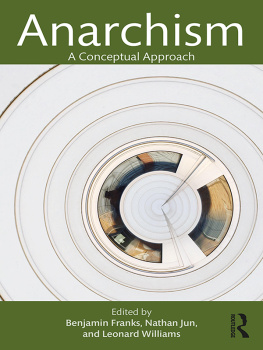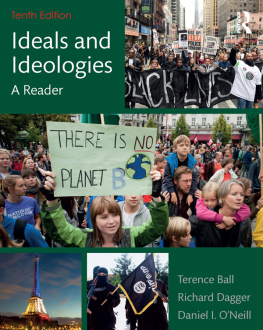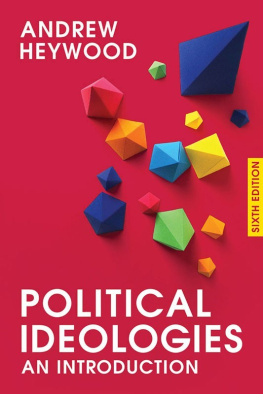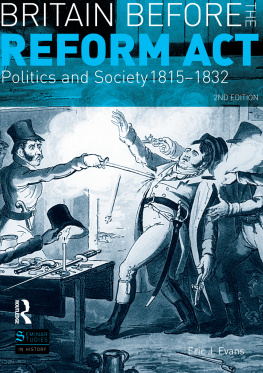Robert Leach - Political Ideology in Britain
Here you can read online Robert Leach - Political Ideology in Britain full text of the book (entire story) in english for free. Download pdf and epub, get meaning, cover and reviews about this ebook. publisher: Macmillan Education UK, genre: Politics. Description of the work, (preface) as well as reviews are available. Best literature library LitArk.com created for fans of good reading and offers a wide selection of genres:
Romance novel
Science fiction
Adventure
Detective
Science
History
Home and family
Prose
Art
Politics
Computer
Non-fiction
Religion
Business
Children
Humor
Choose a favorite category and find really read worthwhile books. Enjoy immersion in the world of imagination, feel the emotions of the characters or learn something new for yourself, make an fascinating discovery.
- Book:Political Ideology in Britain
- Author:
- Publisher:Macmillan Education UK
- Genre:
- Rating:4 / 5
- Favourites:Add to favourites
- Your mark:
- 80
- 1
- 2
- 3
- 4
- 5
Political Ideology in Britain: summary, description and annotation
We offer to read an annotation, description, summary or preface (depends on what the author of the book "Political Ideology in Britain" wrote himself). If you haven't found the necessary information about the book — write in the comments, we will try to find it.
As well as introducing the mainstream ideologies of Liberalism, Conservatism and Socialism, this text examines challenges from nationalist, feminist and Green thinkers, amongst others. Now in its third edition, it includes a new chapter on anarchism and assesses the continuing disillusionment of Britain with the ideas of the Westminster elite.
Political Ideology in Britain — read online for free the complete book (whole text) full work
Below is the text of the book, divided by pages. System saving the place of the last page read, allows you to conveniently read the book "Political Ideology in Britain" online for free, without having to search again every time where you left off. Put a bookmark, and you can go to the page where you finished reading at any time.
Font size:
Interval:
Bookmark:
Political Ideology in Britain
CONTEMPORARY POLITICAL STUDIES SERIES
Series Editor: John Benyon, University of Leicester
Published
JANE BURNHAM and ROBERT PYPER
Britains Modernised Civil Service
CLYDE CHITTY
Education Policy in Britain (3rd edn)
ALISTAIR CLARK
Political Parties in the UK
DAVID DENVER, CHRISTOPHER CARMAN and ROBERT JOHNS
Elections and Voters in Britain (3rd edn)
WYN GRANT
Economic Policy in Britain
WYN GRANT
Pressure Groups and British Politics
DEREK HEATER and GEOFFREY BERRIDGE
Introduction to International Politics
DILYS M. HILL
Urban Policy and Politics in Britain
RAYMOND KUHN
Politics and the Media in Britain
ROBERT LEACH
Political Ideology in Britain (3rd edn)
ROBERT LEACH and JANIE PERCY-SMITH
Local Governance in Britain
ANDREW MASSEY and ROBERT PYPER
Public Management and Modernisation in Britain
PHILIP NORTON
Parliament and British Politics (2nd edn)
PAUL WHITELEY
Political Participation in Britain
Contemporary Political Studies
Series Standing Order ISBN 9780230543508 hardback
Series Standing Order ISBN 9780230543515 paperback
(outside North America only)
You can receive future titles in this series as they are published by placing a standing order. Please contact your bookseller or, in the case of difficulty, write to us at the address below with your name and address, the title of the series and the ISBN quoted above.
Customer Services Department, Macmillan Distribution Ltd, Houndmills, Basingstoke, Hampshire, RG21 6XS, UK
Political Ideology in Britain
Third Edition
Robert Leach

Robert Leach 2002, 2009, 2015
All rights reserved. No reproduction, copy or transmission of this publication may be made without written permission.
No portion of this publication may be reproduced, copied or transmitted save with written permission or in accordance with the provisions of the Copyright, Designs and Patents Act 1988, or under the terms of any licence permitting limited copying issued by the Copyright Licensing Agency, Saffron House, 610 Kirby Street, London EC1N 8TS.
Any person who does any unauthorized act in relation to this publication may be liable to criminal prosecution and civil claims for damages.
The author has asserted his right to be identified as the author of this work in accordance with the Copyright, Designs and Patents Act 1988.
First edition 2002
Second edition 2009
Third edition 2015
Published by PALGRAVE
Palgrave in the UK is an imprint of Macmillan Publishers Limited, registered in England, company number 785998, of 4 Crinan Street, London, N1 9XW.
Palgrave Macmillan in the US is a division of St Martins Press LLC, 175 Fifth Avenue, New York, NY 10010.
Palgrave is a global imprint of the above companies and is represented throughout the world.
Palgrave and Macmillan are registered trademarks in the United States, the United Kingdom, Europe and other countries.
ISBN 9781137332554 hardback
ISBN 9781137332547 paperback
This book is printed on paper suitable for recycling and made from fully managed and sustained forest sources. Logging, pulping and manufacturing processes are expected to conform to the environmental regulations of the country of origin.
A catalogue record for this book is available from the British Library.
A catalog record for this book is available from the Library of Congress.
Typeset by MPS Limited, Chennai, India.
Contents
List of Figures, Tables and Boxes
Figures
Tables
Boxes
Preface
This is the third edition of Political Ideology in Britain. The first and second editions were also published by Palgrave Macmillan in 2002 and 2009. Yet these developed from an earlier title, British Political Ideologies, which went through two editions (1991, 1996) under another publisher. Thus this is effectively the fifth version of a book that has now been in print for nearly a quarter of a century.
There are many other books on political ideologies. This one focuses on ideology in British politics. Political ideologies are not pure political theory, but emerge from, and interact with, the practice of politics. Ostensibly broader accounts of ideologies often involve either an implicit bias towards a limited number of western political systems, or very generalized accounts of political ideas in the abstract, and not illustrated with examples of their application. Relating ideologies to politics in a particular country helps to capture the interplay between political ideas and practice.
Yet the approach is not insular. Distinctive British variants of ideologies are compared with international currents of thought and set against wider political developments. Key concepts of specific ideologies are explored in this wider context before the evolution of relevant political ideas and movements are examined in Britain. The differences between the interpretation and application of political creeds in Britain and in other countries are fully discussed.
What is different in this new edition? Every chapter has been extensively revised and updated to take into account both political developments and new academic work. Beyond that, there is a wholly new separate chapter on anarchism, which I had previously discussed briefly in the chapter on socialism. This made some sense, particularly as anarchism has been weaker in Britain than in many other countries. Yet anarchism is a distinctive and important ideology, which differs markedly from the Labour interpretation of socialism with its strong emphasis on parliament and the state. Moreover, as the terms anarcho-capitalism and Tory anarchism suggest, although most anarchists are linked with socialism and the left, there are also connections with strands of thought on the right. Finally, there are some interesting British anarchist thinkers, from William Godwin onwards, who deserve discussion.
Other changes have followed new developments in British politics since the last edition, including the coalition government, the end of New Labour, the surge of Scottish nationalism, the rise of UKIP, and the strengthening support for the Greens. All these have ongoing implications, some potentially massive. Thus had Scotland voted yes to independence, as once seemed possible, this would have marked the end of British politics. As it is, Scottish politics already seems increasingly different from English politics. It is perhaps still too early to judge the longer-term significance of the UKIP insurgency. I thought initially that it resembled a kind of English nationalism (despite its name). I have since become convinced that it is better described as a form of populism, long familiar elsewhere in the world and increasingly in both eastern and western Europe. So I have included a new section on populism. There have also been major developments in global politics with ongoing implications for Britain, including the continuing economic recession, the renewal of genocidal conflict in the middle east, with the associated intensification of terrorism, and even the threat of a return of the Cold War.
Finally, any book, even if singly authored, is always a joint production. Some of my academic debts with be clear from my references, suggested further reading and bibliography. I also have to thank some anonymous internal Palgrave reviewers, one of whom gave valuable advice on anarchism and populism. I have many to thank at Palgrave, particularly the now (I suspect only temporarily) retired Steven Kennedy and the continuing Stephen Wenham, who seems to have inherited the consummate diplomatic skills of his erstwhile mentor. I also thank Keith Povey who has again skilfully and carefully edited my text. Finally, and as ever, my greatest debt is to my loyal and long-suffering wife, Judith.
Next pageFont size:
Interval:
Bookmark:
Similar books «Political Ideology in Britain»
Look at similar books to Political Ideology in Britain. We have selected literature similar in name and meaning in the hope of providing readers with more options to find new, interesting, not yet read works.
Discussion, reviews of the book Political Ideology in Britain and just readers' own opinions. Leave your comments, write what you think about the work, its meaning or the main characters. Specify what exactly you liked and what you didn't like, and why you think so.

